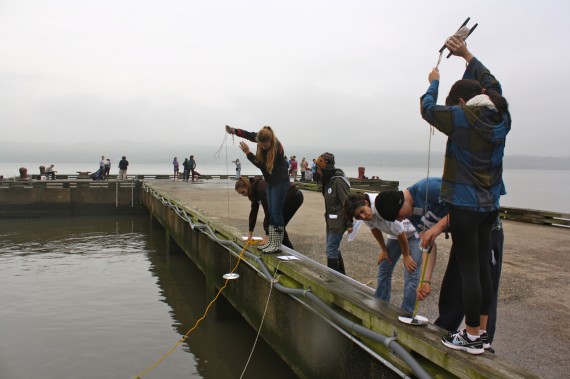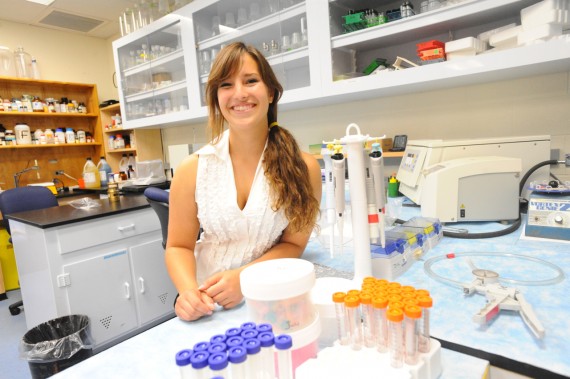Education
Cultivating Science Literacy
Lamont-Doherty’s formal and informal education programs and initiatives offer unusual breadth and seek to provide educators and students at all levels with hands-on lab, field and sea-going experiences.

Local students sample the Hudson River in Piermont, N.Y. as part of the annual “A Day in the Life of the Hudson” event, led by education coordinator Margie Turrin.
Our researchers continue to influence education in Science, Technology, Engineering and Mathematics (STEM) fields on a local and national scale. Their goal is to cultivate science literacy among learners of all ages, including educators. Our Earth2Class program, a series of professional development workshops for teachers led by Michael Passow, is a unique resource for K-12 teachers, students, the general public and geoscientists. Earth2Class centers around Saturday workshops for educators, held on our campus. These sessions provide access for teachers and students to the latest research, are used to develop learning activities directly linked to “real-world” problems and provide scientists with an effective format to disseminate their discoveries more broadly. Since 1998, Earth2Class has held more than 120 workshops, involving nearly 80 Lamont-Doherty scientists.
Our summer research program draws talented undergraduate students from Columbia University, Barnard College, and other colleges and universities around the country. Each year, approximately 30 students are immersed in an intensive, hands-on, 10-week research experience, spending time in the lab and in the field under the mentorship of one or more of our scientists. Many of the undergraduates who participate in this program return to Lamont during the school year to complete a senior thesis, and many present their research at national and international scientific meetings.

The Lamont Summer Intern Program provides undergraduates the opportunity to conduct research in the Earth and ocean sciences.
Much of our formal education is taught through the Department of Earth and Environmental Sciences, which is distinguished as having the best Earth science Ph.D. program in the country, a ranking that reflects our exceptional people, resources and affiliated programs. The bright students bring enthusiasm and innovative ideas, and at the same time lend fresh energy to our current investigations and shape the directions of our future research.
Our world-class scientists also provide professional training and mentoring to a large group of talented postdoctoral researchers, who, like their mentors, will become leaders in their fields. In 2013, our cohort of postdocs numbered almost 50, more than double the number the Observatory supported as recently as five years ago. Those postdocs present on campus in the fall discussed their research with the greater Lamont community during our annual Postdoctoral Symposium.
Enhancing Climate Science Education
The Polar Learning and Responding (PoLAR) Climate Change Education Partnership, led by Stephanie Pfirman, uses creative approaches to engage adults in understanding the rapid changes occurring in the world’s polar regions. Funded by a five-year, $5.6 million grant from the National Science Foundation, the education and outreach initiative includes Lamont scientists Robin Bell, Peter Schlosser, and Margie Turrin, along with partners from Barnard College, Teachers College, The American Museum of Natural History, University of Alaska Fairbanks, University of New Hampshire, and World Without Oil creator Ken Eklund.

The PoLAR Partnership is launching a variety of innovative educational tools and resources to catalyze new ways of learning about climate change at the poles. These activities explore the implications of climate change on polar ecosystems and communities, how current change compares with changes in the past, and how changes in the Arctic and Antarctic regions affect life far from the poles.
By encouraging the use of social, creative, and game-like approaches in formal and informal educational settings, the PoLAR Partnership aims to inspire new methods, practices, and policies for learning about and responding to climate change; explore The Polar Hub to learn more.
We’re Social!
In the past year we’ve enhanced and increased Lamont’s online presence and digital communications with the goal of providing our friends, alumni and the general public more timely and relevant news from campus. We’ve initiated a regular email newsletter, and you can find Lamont on Twitter, Facebook, Tumblr. We hope you’ll follow us and join the conversation online.
Please sign up for our e-newsletter if you’d like to receive monthly updates on our research and educational activities.